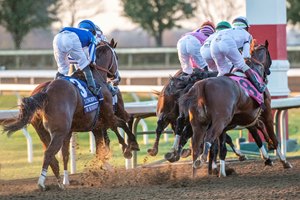Provisions Helpful to Racing Signed Into Law With HISA


President Donald Trump Dec. 27 signed into law COVID-19 relief and government funding legislation that includes the Horseracing Integrity and Safety Act of 2020, which will establish national standards to promote fairness and increase safety in Thoroughbred racing nationwide. The legislative package also includes key tax reform, COVID-19 relief provisions, and extensions of current H-2B visa amendments beneficial to the horse racing industry.
Passage of the HISA culminated a multi-year effort by many industry stakeholders to establish national standards for anti-doping, medication control, and increased racetrack safety for horses and riders. The movement gained momentum in early September when Senate Majority Leader Mitch McConnell (R-KY) authored and sponsored the legislation. The bill passed the United States House of Representatives Sept. 29 by an overwhelming majority and was passed by the Senate Dec. 21, again, by an overwhelming majority.
The HISA legislation will go into effect no later than July 1, 2022, but could be effective earlier following the formation of an independent national racing authority (Authority) and approval of an anti-doping and medication control program and racetrack safety program (Programs) by the Federal Trade Commission. The FTC will review the Programs developed by the Authority, allow for public comment, and once approved by the FTC, the Programs will go into effect.
Another key provision of the government spending legislation is the extension of three-year tax depreciation for all racehorses through 2021. Uniform three-year racehorse depreciation was one of several tax provisions across many industries set to expire at the end of 2020. The provision extends the three-year depreciation schedule for all racehorses through 2021 and allows taxpayers the option to depreciate, on a three-year schedule, racehorses less than 24 months of age when purchased and placed into service.
The $900 billion COVID-19 relief package signed by the President also includes positive provisions relative to horse breeding and racing. Eligible racetracks and farms will be allowed to participate in this second round of the Paycheck Protection Program as they were in the first round after the National Thoroughbred Racing Association helped secure favorable guidance from the Small Business Administration. The new provisions include:
- Expanded PPP loan terms that include new eligibility for horse and farm owners without employees operating as sole proprietors or via single member LLCs;
- New PPP eligibility for qualifying 501(c)(6) organizations with less than 300 employees;
- Additional eligible expenses that now also include software, human resources, accounting, and personal protective equipment for those who have not yet had PPP loans forgiven;
- A second draw PPP loan of up to $2 million that now is available for qualifying businesses with at least a 25% reduction in gross receipts;
- Extension of employer tax credits for paid sick and family leave and employee retention into 2021; and
- Full deductibility of meals from restaurants during 2021 and 2022.
A series of current H-2B visa program amendments are set to continue as part of omnibus legislation. They include:
- Authority for the Department of Homeland Security, in consultation with the Department of Labor, to increase the H-2B cap for fiscal year 2021 by up to approximately 69,000 visas if it determines that the needs of seasonal businesses cannot be met with U.S. workers;
- Continuation of the use of private wage surveys for prevailing wage determinations;
- A prohibition against DOL enforcing the corresponding employment and three-quarters guarantee provisions of its H-2B regulations relating to total work hours; and
- Provisions extending the maximum employment season for up to 10 months, as opposed the nine-months in current DOL regulations.
The NTRA, through its involvement with the H-2B Workforce Coalition, supports efforts for comprehensive reform of the guest worker visa program.
